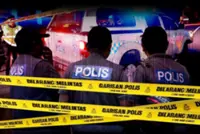Model-actress Zahnita Wilson recently shared about her personal experience of domestic abuse on social media. Photo: mStar
Sharing personal domestic violence experiences on social media may be empowering and could encourage more women to step up and speak out.However, precautions must be taken to ensure safety before such public disclosures, says Women's Aid Organisation (WAO) acting executive director Nazreen Nizam.
All Women's Action Society (AWAM) services officer Pavitra Muniandy agrees: "While this action can help amplify voices and raise awareness, survivors must take steps to protect themselves."
They were speaking on the recent case where Malaysian model and actress Zahnita Wilson revealed her personal experience of domestic violence on Instagram.
In her post which has since been removed, the 39-year-old mother of four showed photos of her bruised face and black eye, and said she had been tolerating the abuse for 20 years for the sake of her children.
Zahnita also said in the post: "I didn't want to do this, but I had to. This is the reason why I left my old house and also why I always wear sunglasses."
Subsequently, in an mStar interview, she says she wanted to encourage other survivors to come forward and speak out against domestic violence.
Zahnita's husband has been brought before the Magistrate's Court and has pleaded not guilty to the charges of causing injury to her.
"When public figures like Zahnita share their experiences of domestic violence, it can demystify and destigmatise the issue, showing that it can affect anyone regardless of their social standing," says Nazreen.
Pavitra says that fear of public judgement, threats from abusers or their associates, and not being believed are common reasons why survivors hesitate to report to authorities, but such public disclosures empower other survivors and give them the confidence to come forward and report their abuse."
The repercussions of posting on social media can vary depending on the situation.
While Zahnita Wilson's decision to share her abuse on social media prompted immediate action, this outcome may not be the same for everyone, Pavitra cautions.
"In some cases, posting about abuse on social media, especially while still living with the perpetrator, could escalate the abuse," she warns. "Perpetrators might retaliate out of anger or shame from being publicly exposed."
"In such instances, survivors who expose their experiences publicly would face increased danger and this could escalate to further violence, harassment or manipulation," adds Nazreen.
"On the other hand, some perpetrators might acknowledge their wrongdoing and be prepared to face the consequences such as complying with investigations or counselling," says Pavitra.
Nazreen says despite there being risks, the overall impact of posting on social media, especially by public figures, is positive in terms of generating public awareness and support for domestic violence issues.
"Public figures have a critical role in shaping societal attitudes towards issues. High-profile revelations can break down the stigma associated with being a victim of domestic violence, challenging societal norms that often lead to silence."
"When they share their stories online, it creates a platform for open discussion and fosters a supportive environment, encouraging other survivors to come forward. I believe this visibility not only helps in personal healing but also helps push for better support system and legal protection for the victims," she says.
"The visibility can also raise public awareness about domestic violence and intimate partner violence – prompting discussions on social and legal reforms needed to protect and support victims," she adds.
"Social media posts can be a powerful way to take control of the narrative, raise awareness, and potentially trigger intervention. The public visibility of the abuse may pressure the authorities to act and deter further abuse as perpetrators risk public backlash," adds Pavitra.
However, survivors must have access to adequate safety planning and support services before speaking out. Legal and social systems must also be equipped to effectively protect them once they choose to publicly reveal their circumstances, the advocates concur.
"Before publicly disclosing domestic abuse, victims should take several safety precautions to protect themselves and their children from potential retaliation," advises Nazreen.
"Consulting with social workers, lawyers, or law enforcement for guidance on the implications of making the abuse public could help in formulating a safety plan such as securing a safe place to stay, changing locks and ensuring that any shared digital accounts are secured," she says.
"Additionally, survivors can reach out to support networks, including friends, family and NGOs who can offer emotional support and practical assistance," she adds.
"Another critical step is to document the abuse through photographs, detailed notes and medical reports, which are crucial for any subsequent legal proceedings," says Nazreen.
To prioritise safety, Pavitra emphasises that survivors first ensure they are in a secure environment before reporting incidents of abuse to the authorities.
"It's crucial for survivors to ensure they are in a safe space before reporting abuse."
"This could mean staying with a trusted person where the perpetrator can't locate them. For those without such support or who are financially constrained, assistance is available from the Social Welfare Department (JKM) which can provide shelter for survivors and their children, and may also issue an emergency protection order (EPO) for their safety," she says, adding it's important to note that lodging a police report isn't required to obtain an EPO.
Malaysia has specific legislation to address domestic violence (Domestic Violence Act 1994) and authorities such as the police and Social Welfare Department are equipped to take immediate action, says Pavitra.
Additionally, women's NGOs play a crucial role in assisting survivors, providing them with legal information, connecting them to appropriate resources, and following up on their cases with the authorities to ensure progress, she says.
As Malaysia has legal pathways viable for survivors of domestic violence, we encourage survivors to continue utilising these avenues before sharing their experiences on social media, she adds.
While platforms for social media can help amplify voices and raise awareness, pursuing formal channels such as lodging a police report, seeking protection orders or engaging with support services would lead to concrete action and safeguards for their well-being, concludes Pavitra.








